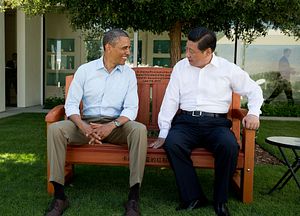U.S. National Security Advisor Susan Rice arrived in China on Friday for a two-day visit expected to finalize preparations for Chinese President Xi Jinping’s visit to the United States in September. On Friday, Rice met with Xi as well as with Chinese State Councilor Yang Jiechi, Foreign Minister Wang Yi, and General Fan Changlong, a vice chairman of China’s Central Military Commission.
According to the White House, on her visit, Rice will “underscore the United States’ commitment to building a more productive relationship between our two countries as well as discuss areas of difference in advance of President Xi’s state visit to the United States in September.”
In recent months, the “areas of difficulties” have overshadowed the “productive relationship” – and it’s not even close. Tensions are rife over the South China Sea, cyberespionage (particularly in the wake of a massive hack into the U.S. Office of Personnel Management), and now the economy, with China’s renminbi devaluation re-sparking the usual U.S. complaints about currency manipulation.
Notably, in the public comments made by Rice and various Chinese officials, the South China Sea and cyber issues were not mentioned. Instead, the two sides tried to accentuate the positive, talking about shared interests and the potential for cooperation. “We stand ready to work with the United States to further boost our practical cooperation bilaterally, regionally and globally, and effectively manage the sensitive issues between us in a constructive way,” Xi told Rice.
Yang, meanwhile, said that the U.S.-China relationship was generally positive. “We have potential to broaden our areas for cooperation and continue building a new type of major-country relationship,” he added. Rice agreed that the relationship was on solid footing: “We have seen our bilateral relationship evolve and strengthen in recent months,” she said.
The popular narrative on U.S.-China relations, however is quite different, and it will take more than official platitudes to shift opinions. Yet the two sides will be hard pressed to finalize a big deliverable that can be showcased during the visit. Last year’s climate change agreement came as something of a surprise, but hopes are low for a similar rabbit to be pulled out of the proverbial hat this time around.
Originally, analysts hoped that the two side could present major progress on a bilateral investment treaty (BIT), but those negotiations aren’t progressing as smoothly as hoped. In his meeting with Rice, Xi expressed his hope for negotiations to progress more quickly – not exactly a ringing vote of confidence in progress to date.
Another potential deliverable – a completed agreement on a code of conduct for unplanned aerial encounters – also seems to be still in the works. In a press conference on Thursday, a spokesperson for China’s Ministry of Defense was coy on the state of those negotiations, saying only that that there have been “multiple rounds of consultations” and that the “relevant consultations are making positive progress.” General Fan used similar language in his public remarks with Rice.
Without a major deliverable to showcase, both Beijing and Washington will have a hard time countering the public perception that ties have taken a major turn for the worse. Meanwhile, the narrative surrounding this visit is also being complicated by U.S. domestic politics. With the 2016 presidential nominees campaigning at full tilt, domestic criticism of the White House’s China policy (a favorite pastime of candidates for decades) is heating up.
One contender for the Republican nomination, Wisconsin governor Scott Walker, recently suggested that the White House cancel Xi’s visit. “Given China’s massive cyberattacks against America, its militarization of the South China Sea, continued state interference with its economy, and persistent persecution of Christians and human rights activists, President Obama needs to cancel the state visit,” Walker said.
Another Republican candidate, Senator Marco Rubio, said the visit should be “downgraded” to do away with the pomp and circumstance of a formal state visit. “They’re not deserving of a state visit,” he said in a radio interview on Thursday.
In response to a question about Walker’s statement, White House Press Secretary Josh Earnest told reporters on Wednesday that Obama “has found engagement with China to be an effective way for the United States to advance our interests around the world.”

































